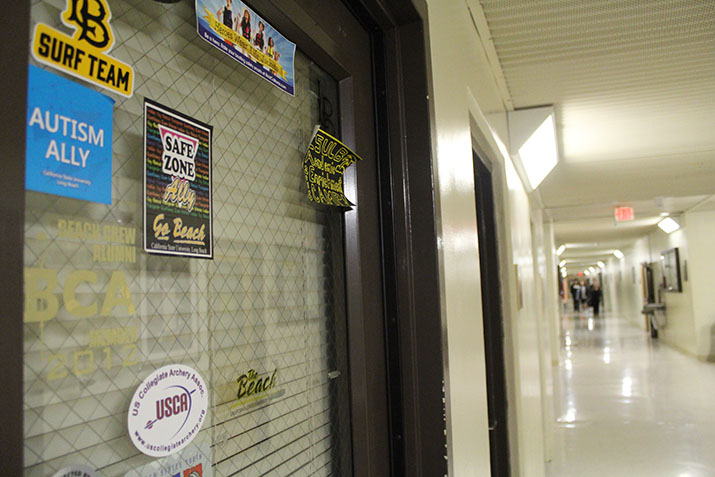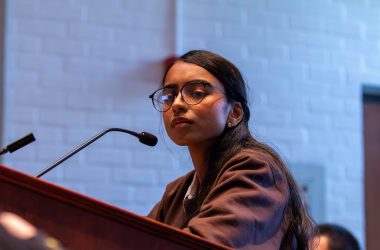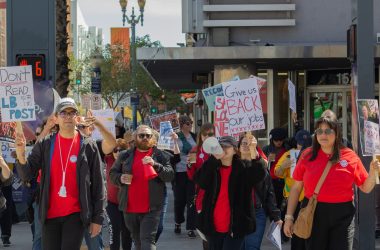Rainbow lettering, the Statue of Liberty, the black star, the blue polyhedron. These colorful decals, which adorn windows, doors and offices around Cal State Long Beach, don’t just show up overnight. CSULB faculty and staff must earn the right to bear these “safe zone” decals on their office doors by completing ally training seminars on campus.
CSULB faculty, staff and administrators can become allies to undocumented, veteran, LGBT and autistic students. Training seminars typically consist of half-day events that feature PowerPoints, discussions and panels.
A “safe zone,” officially identified by the bearing of an ally sticker, can be a person, place or event which guarantees to be inclusive, understanding and supportive of underrepresented individuals and the issues which affect them.
The Safe Zone Project began as an online resource to spread awareness and increase support for the LGBT community, including ally workshops in institutions of higher education. Since Counseling and Psychological Services introduced the Safe Zone Project at CSULB in 2008, other training programs have sprung up on campus. Many of them modeled themselves after the LGBT program, which according to the CAPS website has been a “tremendous success.”
“We make sure every senator attends at least one ally training a semester,” Logan Vournas, ASI Vice President and Safe Zone Ally training student panelist, tweeted in September 2016 after Senate Resolution 2016-18, which outlines semesterly expectations, was approved the previous May.
According to the resolution, “[ASI] officers will be granted the satisfaction of their own personal growth, and their growth in being more diverse student leaders; and be it resolved that each officer will report back to the Board of Directors about what they gained from experience during the training.
“We’re working on having ally training for Muslim students, students of color …” Vournas wrote in a subsequent tweet.
In August 2013, CSULB received 2.5 stars out of five on the Campus Pride Index, which measures colleges’ and universities’ LGBTQ awareness and advocacy practices. This score dismayed Shannon Cholakian, CSULB assistant secretary of lesbian, gay, bisexual, transgender, intersex and queer affairs at the time.
By April 2014, CSULB’s CPI score had jumped to 4 stars, and Cholakian credits the initiation of the Committee on LGBTQ Campus Climate and the Safe Zone Training program for that.
Marshall Thomas, Director of Veteran Services and veteran of the United States Marine Corps, used the LGBTQ ally program as a model for the VET Ally Training program, which he created in 2010 as part of his dissertation for his Doctorate of Education in Educational Leadership. He researched LGBT programs nationwide and has presented his ideas at UCs, CSUs, community colleges and schools on the East Coast.
Veterans need allies on campuses, he says, because they are also “non-traditional students” who have “taken a different route” in their path to education. Veterans are more likely to have to balance college with other responsibilities such marriage and children and because some of them may be dealing with Post Traumatic Stress Disorder, may interact with the world differently than other students.
“[But] some veterans just want to be students; they won’t necessarily want to share that they’re veterans,” Thomas said.
Understanding different students’ needs is at the heart of ally training programs, Thomas said.
The Autism Ally Program, which began in fall of 2013, focuses on teaching participants how to recognize autism in students, understand the autism spectrum, and offer resources for educators to turn to in emergency situations. The Autism Ally seminar offers a “day in the life” skit and video as a way to convey how it feels to be a student with autism, a role play component in which trainees learn to communicate effectively with those on the autism spectrum and a student panel.
“Autism Ally training [programs] are successful because we have been able to reach a large range of faculty and administration on campus and educate them on how to work with students with [Autism Spectrum Disorder], how to refer students to [Disabled Student Services], what services are offered at CSULB,” Ilene Gonzalez, CSULB Autism Services Associate, said.
Their next ally training session will be held this April.
Undocumented ally training, meanwhile, covers immigration history, federal and state immigration laws and financial aid for undocumented students, according to the Dream Success center website. Individuals can opt for a “Literacy Training,” which only covers policies related to undocumented students, or can commit to “Champion Training” to become trainers themselves.
Undocumented ally training sessions have been offered once a semester since fall 2008. Their sticker logo, the Statue of Liberty holding AB540 documentation in her fist, was designed by an AB540 student.
“We need to support our undocumented student community by knowing how we can help them,” Rosita Trujillo, a graduate peer advisor for the CSULB Career Development Center, said.
Trujillo is planning on attending the upcoming AB540 ally training, which was recently postponed to a later and unknown date.
“[Faculty and staff should understand] the history of what has been occurring, how policy has shaped accessibility and how we can be more active as allies in opening doors and opportunities – basically how can we work with and for our undocumented community,” she said.
The Autism Ally website lists more than 200 allies and the LGBT Safe Zone website lists more than 240.
“Someday there’ll be a day that we don’t need ally programs,” Thomas says hopefully.
Until then, the ally training programs are a necessary resource, he said.
“We need to equip not just our staff and faculty but even our Long Beach community with knowledge to be proactive,” Trujillo said. “We can not afford to be passive anymore.”




